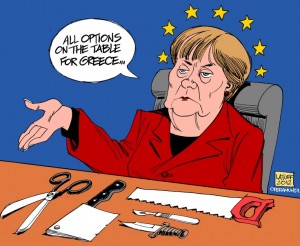Joschka Fisher writes: Merkel’s role has changed. Her ten years in power were largely characterized by a new German Biedermeier era. The sun was shining on Germany and its economy, and Merkel regarded it as her highest duty to maintain citizens’ sense of wellbeing by not disturbing them with politics. But Germany’s new significance in Europe has put a brutal end to Merkel’s neo-Biedermeier era. She no longer defines her policies in terms of “small steps”; now she takes strategic threats seriously and confronts them head-on.
This is also true of the Greek crisis, in which Merkel – despite her public image in southern Europe – was not aligned with the hawks in her party and administration. Indeed, Merkel seems to be well aware of the unmanageable risks of a Greek exit from the euro – although it remains to be seen whether she can muster the determination to revise the failed austerity policy imposed on Greece.
Greece has also shown that the euro crisis is less a financial crisis than a sovereignty crisis. With the recent election of the anti-austerity Syriza party, Greek voters stood up against external control over their country by the “troika” (the European Commission, the European Central Bank, and the International Monetary Fund), Germany, or anyone else. Yet if Greece is to be saved from bankruptcy, it will have only foreign taxpayers’ money to thank for it. And it will be nearly impossible to convince European taxpayers and governments to provide further billions of euros without verifiable guarantees and the necessary reforms.
The Greek conflict shows that Europe’s monetary union is not working because one country’s democratically legitimized sovereignty has run up against other countries’ democratically legitimized sovereignty. Nation-states and a monetary union do not sit well together. But it is not hard to understand that, should “Grexit” occur, the only geopolitical winner would be Russia, whereas in Europe, everyone stands to lose.
Though the geopolitical risks have, so far, barely figured in the German debate, they greatly outweigh any domestic policy risks of finally coming clean with the German public. Greece, Germans should be told, will remain a eurozone member, and preserving the euro will require further steps toward integration, up to and including transfers and debt mutualization, provided that the appropriate institutions for this are established.
Such a step will require courage, but the alternatives – continuation of the eurozone crisis or a return to a system of nation-states – are far less attractive. (Germany has a new national-conservative party whose leaders’ declared aim is to pursue a pre-1914 foreign policy.) In view of the dramatic global changes and the direct military threat to Europe posed by Putin’s Russia, these alternatives are no alternative at all, and the Greek “problem” looks insignificant.
Merkel and French President François Hollande should seize the initiative once again and finally put the eurozone on a sound footing. Germany will have to loosen its beloved purse strings, and France will have to surrender some of its precious political sovereignty. The alternative is to stand by idly and watch Europe’s nationalists become stronger, while the European integration project, despite six decades of success, staggers ever closer to the abyss.

